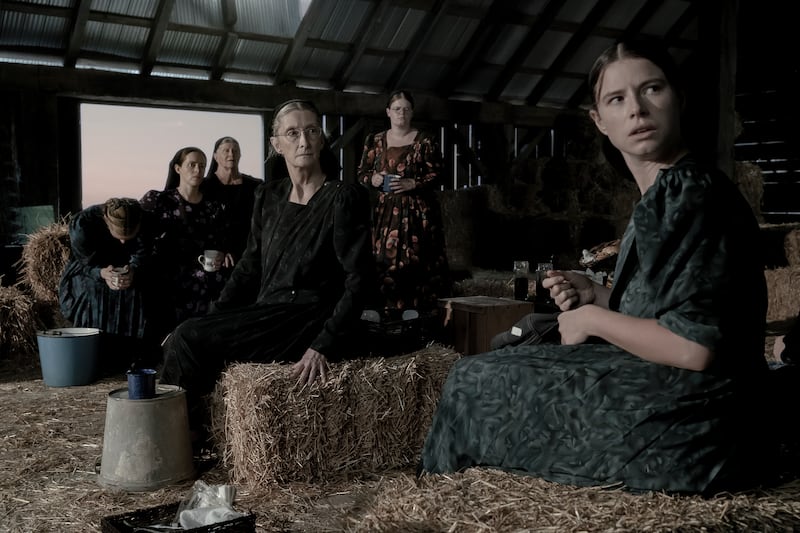Sarah Polley’s best picture Oscar-nominated movie “Women Talking” is made up of questions.
Based on the 2018 novel by Miriam Towes, it is set in an agrarian religious community, where a group of eight women gather in a hayloft to discuss what to do about the plague of sexual assaults that they have been suffering under. Prevailing for who knows how many years, the attacks had been chalked up to demons and nightmares by the religious leaders. That is, until one man was caught mid-attack.
Several were arrested and the men who were not have traveled to town to arrange bail. The women of the community are left with only a short amount of time to decide their future. Do they forgive and move on as before, stand and fight, or leave for the great unknown?
Forces the viewer to engage with moral questions
“Women Talking” is an immersive, claustrophobic, galvanizing, intelligent and sensitive inquiry into the power of conversation and deliberation.
As questions are posed, each of the women has a different point of view and set of circumstances that they are drawing upon for an answer. The constant barrage of questions and moral dilemmas has the effect of pulling the viewer into the movie’s drama, subliminally forcing them to consider the events unfolding and answer questions for themselves.
There is no way for the audience to only passively observe. Polley’s filmmaking forces you to take a stand.
Avoids feeling like a filmed play
“Women Talking” is 104 minutes of women talking in a barn. It is material led by the dialogue, and one that only leaves the one setting for very brief digressions.
The bad version of “Women Talking” would have felt as stolid and stuffy as a filmed play, with very little sense of how cinematic techniques such as camera movement and editing can help to tell a story, and one-dimensional characters that are only exist as a mouthpiece for a specific point of view.
Luckily, Sarah Polley is a talented director, one of the most intelligent, sensitive and humanistic working today. (Her lack of a nomination for a Best Director Academy Award is a travesty.) Every potential pitfall is deftly avoided.
Like Sidney Lumet did with “12 Angry Men,” Polley uses the camera to create a sense of gripping suspense and make one feel as though they were in the hayloft with the deliberators. Long dialogue scenes are given the same propulsive intensity as the action scene in a thriller by Polley and an astounding acting ensemble.
Brilliant ensemble performances
One of the beauties of “Women Talking” is the coordination of the performances. Everyone is on the same wavelength — no one performance is better than another. They are able to provide an emotional scope and depth, a sense of a world beyond the barn walls and lives led before the camera was turned on. All of them are heroic.

Rooney Mara as Ona is curious and dreamy, approaching the moral quandaries as a poet, and provides the movie with a beguiling gentleness. She is positioned in direct opposition to Claire Foy as Salome her sister, the mother of a young victim, whose pain has been channeled into righteous fury and a wish for revenge. Jessie Buckley is commanding and implosive as Mariche, the wife of an attacker, full of contempt. She has suffered in silence — why can’t everyone else? Sheila McCarthy and Judith Ivey play the Grandmothers of the group, expressing years and years of untold trauma.
The social internet meme of “Not all men” is examined and deconstructed through the character of August (Ben Whishaw), the soft-spoken and thoughtful schoolteacher who joins the group in order to take notes, as women have been barred from learning to read and write in the community.
All of the characters feel like real people and not metaphors for the writer to move around. The hesitations and desires expressed by the women are directly tied to their personality and outlook, and they are afforded the opportunity to change their mind. Most of the women don’t end with the same position on how to respond to the attacks and move forward as they started out with. It’s exciting to watch people fight and change their mind and come to a consensus. Polley’s skills shine as she very intimately shows us the emotional process of the characters, the internal steps that they take to come to each position. “Women Talking” treats every point of view, even the most contradictory, with respect and interest, rather than pushed to the side and shrugged off as foolish or ill-informed.
Polley’s generosity of spirit extends beyond the barn walls of “Women Talking” and into the audience, as evidenced by the way she involves the viewer in the story. She extends to you the opportunity to ask the same questions and undergo the same emotional process as the character. If not, the very least you can do is listen to what the women have to say.
“Women Talking” is rated PG-13 for mature thematic content including sexual assault, bloody images and some strong language.


